2021 seems to be the year of the COLLAB in the online space, and I am definitely here for it. Since I have been drafting a number of Joint Venture Agreements, Partnership Agreements, and contractor/licensing agreements for clients and customers on this topic, I wanted to give some insight into some (disclaimer: not ALL!) the ways you can structure a partnership or collaboration if you’re wanting to create something with another coach or consultant.
- Joint Venture
This phrase may be totally new to many of you, and if so – stick around! I promise we won’t bore you too much. A “Joint Venture” is the term used to describe any kind of shorter-term partnership between two or more people or entities, coming together for a specific purpose or project, but NOT merging any business entities or getting rid of any current business entities. The nice thing about a Joint Venture is that it is clear you are entering into this project separately — the joint venture is separate from the participating coaches/consultants’ current businesses.
Typically, most people will want to set up a new business entity (LLC or Corporation) for the joint venture, since the coach or consultants’ current businesses will be separate and distinct from the joint venture. Because of that, it is VERY important that there is a clear, complete, and binding Joint Venture Agreement in place between the two or more participants, and that the new business entity’s operating agreement is clear as to how the new business will work. Enlist the help of a knowledgeable business attorney here to make sure your agreements are top notch. This is not the time to try to DIY your legal contracts, especially when there are multiple businesses involved.
The Joint Venture could be a great option for two coaches or consultants were coming together to co-create a course, program, or other service that would be sold and delivered together, but separate from their other businesses and endeavours.
- Partnership
Another option for ways to legally collaborate with others is to utilize a Partnership Agreement to outline the parameters of the relationship. If the collaboration is meant to be more permanent, and will be established as a longer-term partnership, a Partnership Agreement may be the way to go. Keep in mind, you can make the decision to legally form a General Partnership (which is a type of business entity, along with the LLC or Corporation), or you can utilize a partnership agreement more generally, to outline the boundaries, parameters, and other terms under which you and your partner would like to do business.
- Contractor / Licensing
Another way I have seen creators in the online space work together is to have one business hire the other business as a contractor to perform all work that is to be completed in connection with the collaboration. The collaborators use an independent contractor agreement to outline the terms of the collaboration – which here, would look different than a typical contractor agreement you may use with your team members, as the contractor would likely have a more substantial payment structure, and may keep ownership of some or all of the work completed for the collaboration.
However you decide to structure your collaboration, make sure you have SOME kind of legal agreement in place, that accurately reflects the relationship between you and the collaborator. It’s worth spending the money to make sure this is done right (and you can split it with your collaborator!)
Need an agreement with a collaborator? Email me directly HERE to get started.
Grab my FREE Legal Checklist to see if Your Business is Legally Compliant!


